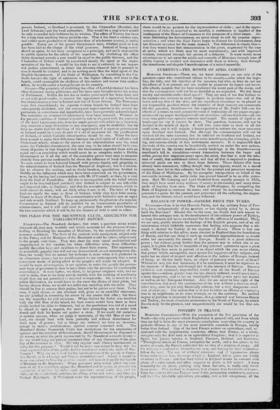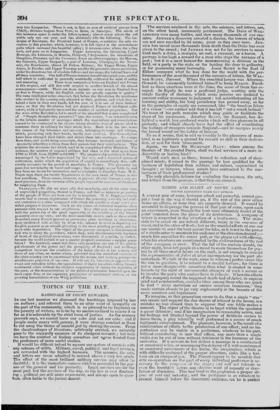POVERTY IN FRANCE.
MORNING CRRONIel.E—With the exception of the five provinces of the North—time only provinces which Englishmen in general visit, and from which they are led to form the most erroneous conclusions respecting the country in general—France is one of the most miserable countries in Europe, hardly better than Ireland. One of the best French writers on agriculture, well ac quainted with the neighbouring countries, affirms that France, as a whole, occupies only the filth rank as an agricultural kingdom; that it is superior to Spain, but greatly inferior to England, Flanders, Holland, and Germany.
"Throughout almost all France, excepting time north, and a few places in the centre or south, the French cultivator has no idea of a rotation of crops. All his inditsmy is ciinfhled to laimuring one year, and lea.ving his land in absolute fallow the next. The use of artificial meathm-s, and of leguminous. plants being unknown 0, him, the crops which in England foll,mw grain are totally awanting in Fra:-re and that land which in England would be covered with plants of a value equal, and often superior to grain, is left naked. A lease nominally for six years, yielding, only three harvests, is really only worth
three vears. method is however, that of more than two-thirds of France.
'Fake the tn s:sy from Paris, proceeding southwards, and you will fleet ,le,esteble agriculture prevailing, with a few exceptions, all tit, way into Languedoc. There is not, in fact, an acre of artificial grasses from Chailly, thirteen leagues from Paris, to Riom, in Auvergne. The whole of this immense space is under the fallow system ; almost every where the soil yields only rye one year, and lies absolutely idle the following. The Le- magne of Auvergne, the Promised Land of France, ccaistitutes the only ex- ception to this practice, which, however, is in full vigour in the mountainous parts which surround this beautiful valley; it recommences where the valley ends, and goes on to Languedoc. Upper Auvergne, the Gevaudan, Upper Rouerge, the Limousin, la Marche, Perigord, l'Angoumois, the mountains of Dauphine, Provence and the Cevennes, know no other cropping ; the Morvan, the Gatenais, Upper Burgundy, a part of Lorraine, Champagne, the Never- nais, the Bourbonais, almost all Poitou, Brittany, the Upper Maine, Upper Anjoo, le oPerche, and Upper Touraine are,like the provinces above mentioned, under the disastrous law of absolute follows and rye crops, the habitual harvest of all these countries. One half of France remains uncultivated each year, andlthe half which is cultivated is generally wretchedly cultivated for want of outlay and manuring. . . . There is no comparison between England and France in this respect, and still less with respect to another branch of the utmost consequence—cattle. There are more animals on one acre in England than on four in France, while the English cattle are greatly superior in quality." The same intelligent writer observed, that before the Revolution the gentlemen • who resided in the country only attended to their gardens, and when they re- tained a ferns in their own hands, left the care of it to one of their farmers' sons ; so that the Revolution had not deprived France of intelligent culti- vators, while it had greatly increased the number of resident proprietors. But the wars of the Revolution led to much of the mischief that is now complained of. "People thought they perceived," says this writer, " an indemnification in the infinite number of marriages which the requisitions and conscriptions caused to be contracted in the classes whose absolute want of means used to condemn them to celibacy for their whole lives. Such is in the two sexes the swarm of (lay labourers and servants, belonging to farms and villages, which, possessing only their hands, hardly ever married. The Conscription Laws have changed their habits and driven them into marriage. To escape these laws, and avoid being conscripts, they became husbands and lathers of aposterity inheriting nothing from their parents but their wetchedness. This explains the atrocious fact which used to he complained of by Ministers. For instance, the number of exposed children had risen in the short space from 1790 to 1799, from 23,000 to 62.000." The progress of population in France encouraged by the habits engendered by the war, and a wretched system of cultivation, under which the acquisition of capital is exceedingly slow, suffi- ciently accounts for the growth of mendicity in France. The peasantry are poor, live wretchedly on bread and soups ; they multiply as our Irish do, and they have no desire for instruction, and no examples to stimulate them. M. C. Dupin says there are twenty departments in the very heart of France in this low condition. There seems, however, at present all over Europe a very ge- neral pressure, from the increase of the people beyond the increase of the means for employing them.
STANDARD—To this we roust add, that mendicity, and all the other vices of unprovided pauperism, abound in France, and that an immense proportion of the people of Paris are born and die in hospitals. M. C. Dupin positively asserts that in twenty departments of France the peasantry is wholly and with- out exception in a state, compared with which the condition of our worst pro- vided paupers is luxurious. Such arc the results of statistical inquiries when pursued with respect to our neighbours. Year after year we were pestered with the parrot cry of the great superiority of the condition of the French peasantry over our own; and the most incredible stories, such as those which described every French peasant as possessing plate and linen in abundance, were swallowed with avidity by those who seemed to revel in depicting the English peasant as an animal grovelling in the most grinding poverty, and the most utter degradation. The object of the persons occupied in this unnatural task was to decry the poor-laws, which they, with the characteristic hardness of heart of the political economists, were determined, if possible, to abolish, because the world (which is not a quarter peopled) contained a surplus popu- lation! We fearlessly assert that these very poor-laws are one of the princi- pal elements of the power and the prosperity of England ; and challenge comparison between the condition of the lower classes of our country and those of any other, no matter where, provided that the statistical accounts of the other country can be ascertained with the minute and useless, perhaps the .mischievous precision of our own. It will not do, however, to oppose to our exact and merciless tables, the speculations of dandy travellers rolling through continental cities without the slightest opportunity of seeing the condition of the poor, or the demonstrations of the political economists founded upon the most vague data, or the vapouring panegyrics of continental orators, ur the growling lamentations of our Whig politicians.



















 Previous page
Previous page